Current Features
Alumni Make It Their Business to Help
– USF RESPONDS: COVID-19 –
By Joey Johnston ’81
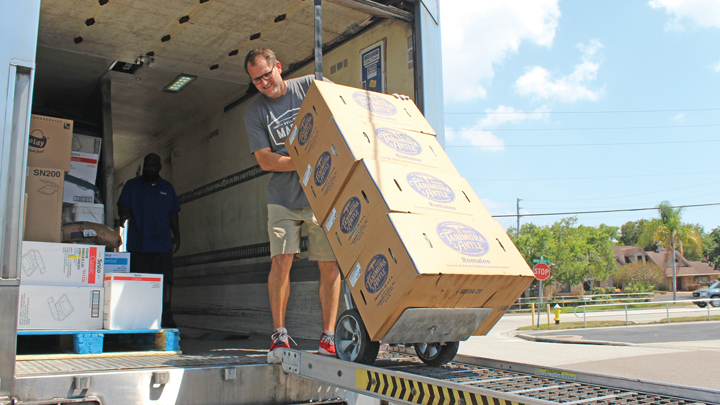
COVID-19 HAS CHANGED nearly every aspect of American life, especially the progress of small business. But USF alumni have stepped up in their communities, making it their business to help.
“You hear over and over how small business is the backbone of our economy,’’ says Eileen Rodriguez, regional director of the USF Small Business Development Center. “It’s so true. It really hurts to see how many of them have been severely affected by the COVID event.
“But what we’re seeing is how innovative these small businesses really are. They can really turn on a dime, just pivot and completely change the products and services they’re selling in order to be more relevant to the needs of right now."
Rodriguez, MS ’87 and MBA ’02, Life Member, leads an agency serving a 10-county chunk of Florida. It offers assistance to existing and prospective small businesses, continuing to grow a 40-year-old network.
During the coronavirus pandemic, Rodriguez has been heartened by the can-do attitude of Bull-owned and -led businesses.
“Small business owners are unique people,’’ she says. “They have a passion for what they do. They do everything in their power to help their businesses continue to work.
“Now we have come to a time when almost everyone needs alternate solutions. It’s inspiring to see businesses helping people with that same level of passion."
Here are just a few examples of business leaders who’ve found creative ways to lead with their hearts.
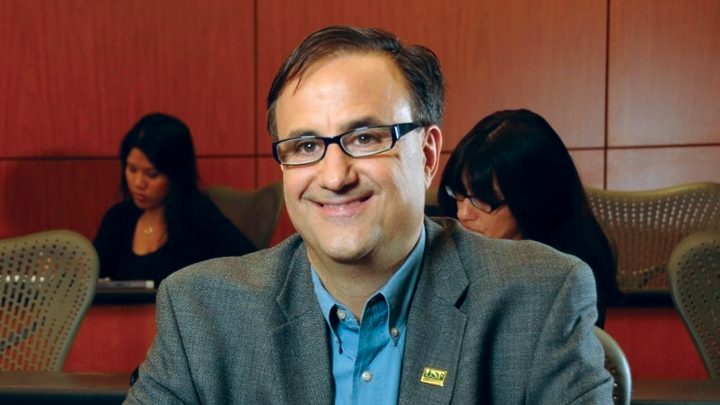
On borrowed time
Nick Vojnovic, MBA ’12, owner of the 43-restaurant Little Greek Fresh Grill chain, says he’ll forever be indebted to the USF community for its support during his time of need. In 2019, Vojnovic contracted myelofibrosis, a rare blood cancer that required a stem-cell transplant.
“So many people have helped me. I’m very eager to help in any way I can, Vojnovic says. “Things are tough all around with the COVID, no doubt, but I feel like I’m on borrowed time.“
So when Vojnovic learned of shortages in the Feed-A-Bull food pantry for financially struggling students on USF’s Tampa campus, he swung into action.
Little Greek has donated about 100 hot meals per week – two for every student who uses the food pantry – and he’s on the 100-meal donation rotation for Hillsborough Hope, a non-profit agency that aids the homeless.
Additionally, Little Greek’s Fowler Avenue location offered buy-one, get-one-free deals for anyone affiliated with USF.
Fast-food businesses relying on takeout and drive-through customers dropped about 20 percent of their business during spring COVID restrictions. Fast casual restaurants (like Little Greek) declined about 40 percent, Vojnovic says.
But Little Greek’s Fowler Avenue location, adjacent to USF’s campus, has skewed those economic stats. Its business declined by 80 percent, understandable considering the ghost-town USF’s once-bustling campus suddenly became.
“You have ups and downs in life and no doubt, this has been very difficult,“ Vojnovic says. “But even in tough times, you know other people have it worse. We want to give back.“
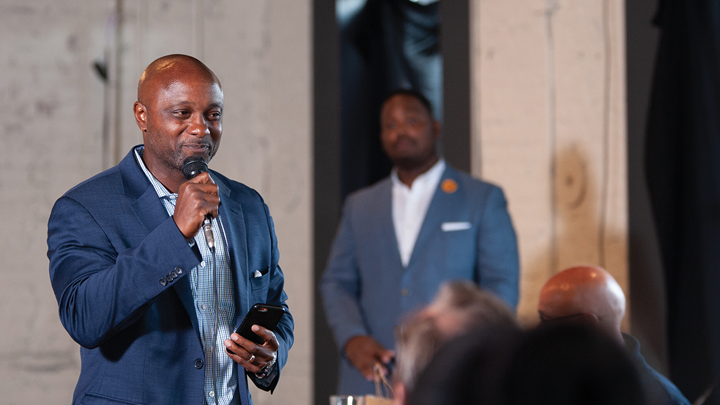
Energizing small businesses
Former USF basketball player Anddrikk Frazier, ’01, Life Member, is managing partner of Integral Energy, which provides natural-gas services and alternative fuels to public, private and governmental entities. Many of the clients are restaurants, hotels and fitness facilities — so 60 percent of his company’s customer base closed in the spring with another 15 percent on reduced service.
In January, Frazier had heard from a fellow Bull, an infectious diseases physician, about a “nasty” virus that had just showed up in the Seattle area. Frazier’s friend warned him repeatedly that it could spread like wildfire, so Frazier began modifying his business in late February.
“Our company is still being hurt, but without the precautions, it could have been catastrophic,“ he says.
“This is a different crisis than the (financial) crisis we experienced in 2008 and 2009. This is a bottom-up situation, a completely different kind of paralysis. People are already struggling and now they’re not working. However we can, we want to help with solutions.“
Integral Energy has partnered with an electric-cart company to facilitate delivery transportation for his small-restaurant clients. The restaurants can manage their deliveries without incurring delivery service fees.
His company is also connecting small businesses to communications networks, such as the Tampa Chamber of Commerce. And it gathered attorneys and accountants for a small-business seminar.
“When small businesses fail, it’s bad for all of us,’’ he says. “So we’re focusing on doing all we can to help these businesses stay open. You want the high tides to raise all boats. If the most disadvantaged person on my team can’t contribute, then it’s not good for my team. That’s the way I view business.“
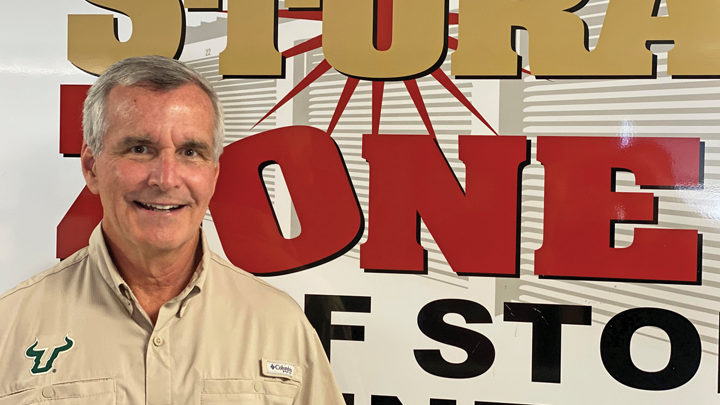
The gift certificate challenge
Jay Nault, ’83 and MBA ’84, Life Member, president/CEO of Storage Zone Self Storage and Business Centers, has 35 locations in Florida, Georgia and South Carolina. While constantly traveling from his home base of Jacksonville to other market areas, he developed an affection for the local mom-and-pop restaurants.
So he selected 50 of them, sometimes working through area agencies, and purchased $1,000 worth of gift certificates from each.
“But bringing $50,000 to a problem like this is like bringing a squirt gun to a forest fire,“ he says. “It’s nice, but all by itself, it’s not going to make a huge impact. But what if others were inspired to do something similar?“
Nault proposed the Hometown Restaurant Gift Certificate Challenge (view more details). He challenged Storage Zone’s vendors, suppliers and stakeholders — along with competitors, neighboring businesses and individuals — to purchase small-restaurant gift certificates and use them as holiday gifts or employee incentives.
Nault sought to provide operating cash and more customer traffic for the restaurants, which he describes as “the heart of every community.“
“For most small independent restaurants, this has become a real disaster,” Nault says. “They were ordered to close and many didn’t have fully developed delivery or takeout options.
“I’ve been in small business my whole life. So my heart really goes out to small-business owners who, through no fault of their own, have basically been put out of business by this pandemic. The great food, the service and the familiarity of these restaurants are such a part of our lives. We just want to help.“
Taking it to the bank – the food bank
About six years ago, USF Sigma Nu fraternity brothers Chris Scott, ’92, Life Member, and Alumni Association board member Bruce Van Fleet, ’73, Life Member, purchased a convenience store in Pinellas County’s Belleair Bluffs community. They transformed it into the Belleair Market, branded it as “Your Corner Store,’’ and quickly made it a go-to for home-cooked meals, catering, gourmet food, fine wines and cigars.
“We like to think we’re unique,“ Scott says. “Early in the day, we can be more of a grab-and-go kind of place. Later in the day, we might be more of a wine-and-cheese shop.“
In late March, the Belleair Market became a lifeline.
When one of its suppliers had a surplus of inventory because of decreased demand from restaurants, the Belleair Market bought pallets of the food, which it donated to the RCS Food Bank.
All told, the partners gave 2,150 pounds of food — enough to feed 17 families of four for a week.
“The Sysco truck delivered the food to us, then the RCS truck picked it up,“ Scott says. “And that wasn’t the end of it. That RCS truck driver kept in touch with Sysco and got more food donations. So it was truckload after truckload of food that might have gone to waste and instead was used for a worthy cause.
“As difficult as this time has been, you see so many good people and good things coming out of it.“
Some good has come to Belleair Market as well.
Despite drastic reductions in some areas, such as catering, delivery has picked up and the prepared family style meals are popular with walk-in customers.
“I think we have been fortunate,’’ Scott says. “So far, we’ve been able to keep the business where it needs to be. If we can help the community that has been really good to us, it’s all the better.“
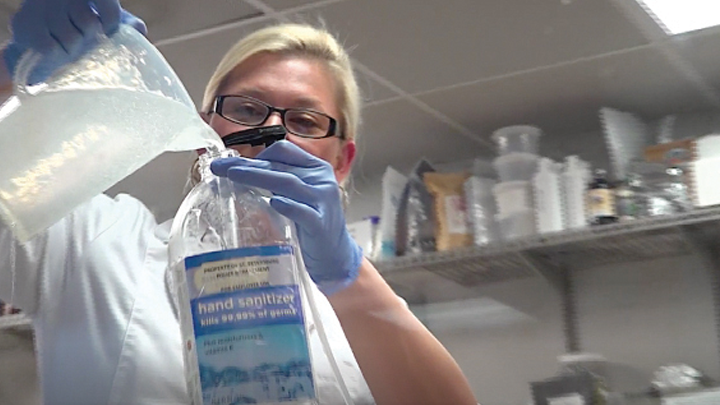
Brewing a solution
On St. Patrick’s Day, St. Petersburg’s 3 Daughters Brewing shut its tasting room and brewery to the public due to COVID-19. Owner Mike Harting had one question for his director of quality assurance, Desiree Chubb, ’19, USF St. Petersburg.
“Do you know how to make hand sanitizer?“
Chubb, one of two certified beer chemists in Florida, said she did.
And away they went.
After a 39-day odyssey, the firm had produced 4,290 gallons of what had become a hard-to-find commodity. They gathered it in whatever containers they could find, from 4-ounce tubes to 5-gallon buckets, and distributed — free of charge — to hospitals, first responders, airlines, nursing homes, gas stations, private businesses and individuals.
Every batch was produced in 30-gallon containers, mixed by paddles normally used for concrete, and tested for quality.
“We are a charitable company and we want to help our community,’’ Chubb says. “It kept us busy and really gave us a feeling of satisfaction.“
Chubb consulted with the World Health Organization to get the correct mixing ratios. The sanitizer ingredients — ethanol, isopropyl alcohol, hydrogen peroxide, glycerin and distilled water — were mostly donated by other companies.
On the first distribution day, they offered 450 4-ounce bottles to anyone who stopped by. But the offer drew crowds so 3D Brewing found a safer way to share.
At the same time, it continued brewing its mainstay while also becoming a sudden media darling. The company’s response to the pandemic was featured in newspapers, television news shows and even the nationally syndicated LIVE with Kelly and Ryan program.
“I think I will smell hand sanitizer the rest of my life,“ Chubb says. “Our business is brewing, so there’s no chance we’re going in a new direction like Purell.
“He (Harting) has always done things like this and he wanted to help. Hopefully, we eased some tension. At times like this, we all need more compassion and empathy. I hope we were an example for that.“